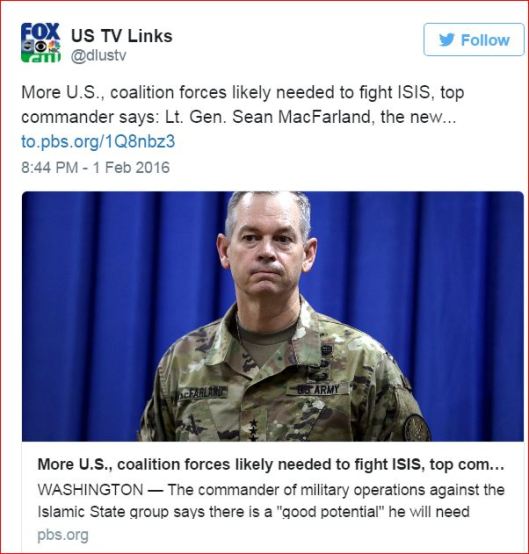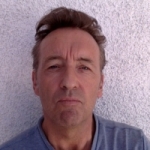
February 10, 2017
Syrian President Bashar al-Assad gave interview to Yahoo News in which he stressed that the US needs to be genuine regarding the fight against terrorism if it wants to really defeat terrorism in Syria, adding that this aim requires a clear political position on the part of the US towards the sovereignty and unity of Syria and cooperation with its government and people.
The following is the full text of the interview:
Question 1: Mr. President, thanks for giving us the opportunity. This is your first interview with American media since President Trump has taken office. Have you had any communications with President Trump directly or indirectly, or anybody in his administration?
President Assad: No, not yet.
Question 2: This is an opportunity for you to convey a message to President Trump, if you have one. What would you like to say to him?
President Assad: wouldn’t convey the message through the media, I would send it through a different channel, maybe diplomatic channels. But any message for us is the public one, we don’t have two messages; we have one stand, one position toward what’s happening in Syria, and it’s about fighting terrorism.
Question 3: You said yesterday, I believe, that what you have heard from the new administration is promising. Explain what you meant.
President Assad: The position of President Trump since he started his campaign for presidency till this moment is that the priority is to fight terrorism, and we agree about this priority, that’s our position in Syria, the priority is to fight terrorism, and that’s what I meant by promising.
Question 4: You indicated that you thought there was some way for cooperation between the United States and Syria, but you didn’t explain what that would be. What sort of cooperation can you envision?
President Assad: Against terrorists, and against terrorism. That’s self-evident for us. This is beside having cooperation between any two nations, but in the meantime, in these circumstances, the priority is to have cooperation in fighting terrorism between the different nations, including Russia, Iran and Syria, of course.
Question 5: The President has tasked his Secretary of Defense with developing plans for defeating ISIS or Daesh. Among the proposals they are reportedly considering is using more special forces and even military assets such as Apache helicopters inside Syria, and arming Kurdish fighters who are fighting Daesh in the north. If such moves would defeat ISIS, would you welcome them?
President Assad: Could the American prowess defeat the terrorists in Afghanistan or in other places? No, you cannot… it’s not enough to have this Apache or F-16 or F-35, whatever you want to label it, to defeat terrorists. There has to be a more comprehensive way of dealing with that complicated issue. So, if you want to start genuinely, as United States, to do so, it must be through the Syrian government. We are here, we are the Syrians, we own this country as Syrians, nobody else, nobody would understand it like us. So, you cannot defeat the terrorism without cooperation with the people and the government of any country.

Question 6: But you have welcomed Russian troops into your country. Would you welcome American troops into your country?
President Assad: We invited the Russians, and the Russians were genuine regarding this issue. If the Americans are genuine, of course they are welcome, like any other country that wants to defeat and to fight with the terrorists. Of course, with no hesitation we can say that.
Question 7: So, you want American troops to come into Syria to help fight ISIS?
President Assad: Troops is part of the cooperation. Again, let’s go back to the comprehensive, you cannot talk about sending troops if you’re not genuine, if you don’t have a clear political position toward not only the terrorism; toward the sovereignty of Syria, toward the unity of Syria. All these factors would lead to trust, where you can send your troops. That’s what happened with the Russians; they didn’t only send their troops. First of all, there’s a clear political position regarding those factors. This is where the Russians could come and succeed in fighting the terrorists in Syria.
Question 8: Do you see cooperation between the United States and Russia to attack ISIS in Syria?
President Assad: It is essential. Any cooperation in any conflict around the world, it needs the, let’s say, the rapprochement, between the Russians and the Americans. It’s very essential, not only for Syria.
Question 9: Well, you talk to the Russians all the time, don’t you?
President Assad: Of course.
Question 10: Yeah? When’s the last time you spoke to President Putin.
President Assad: A few weeks ago.
Question 11: What’d you talk about?
President Assad: About the problem in Syria, about the advancement of the Syrian Army in Syria.
Question 12: Right. Are you going to try to broker some sort of arrangement between the United States and Russia in this fight?
President Assad: There’s direct contact between them, and President Putin had a telephone call with President Trump a week or so, and they talked about different issues including Syria, so they don’t need my role to do so, and we don’t have any contact with the Americans to help the Russians make contact or improve their relation. We’re not in that position.
Question 13: President Trump recently said he absolutely wants to create “safe zones” inside Syria to protect refugees, and possibly allow many of them to return. If such a move would help protect your country’s endangered citizens, would you support that?
President Assad: But actually, it won’t. It won’t. Safe zones for the Syrians could only happen when you have stability and security, where you don’t have terrorists, where you don’t have flow and support of those terrorists by the neighboring countries or by Western countries. This is where you can have a natural safe zone, which is our country. They don’t need safe zones at all. It’s much more viable, much more practical and less costly to have stability than to create safe zones. It’s not a realistic idea at all.
Question 14: Upwards of half of your country’s population has been displaced. How can you say that safe zones to protect them from bombardment would not be helpful?
President Assad: The first thing you have to ask: why were they displaced? If you don’t answer that question, you cannot answer the rest. They were displaced for two reasons: first of all, the terrorist acts and the support from the outside. Second, the embargo on Syria. Many people didn’t only leave Syria because of the security issues. As you see, Damascus is safe today, it’s nearly normal life, not completely. But they don’t find a way for life in Syria, so they have to travel abroad in order to find their living. So, if you lift the embargo, and if you stop supporting the terrorists – I’m not talking about the United States, I’m talking about everyone who supported terrorists including the United States during Obama’s administration – if you stop all these acts, most of those people will go back to their country.
Question 15: There are, what, 4.8 million Syrian refugees since this crisis began. Just as way of comparison, that is more than 4 times the total number of Palestinian refugees from the events of 1947 and 48. Do you accept that this is a humanitarian disaster?
President Assad: It is a humanitarian disaster created by the Western support of those terrorists, of course, and the regional support by Turkey and Qatar and Saudi Arabia. It didn’t happen just like this.
Question 16: And you bear any responsibility at all for this disaster?
President Assad: As president?
Journalist: Yes.
President Assad: Regarding the policies that I undertake since the beginning of the crisis, they were supporting the dialogue between the Syrians, fighting terrorists, and supporting reconciliation, and they succeeded. So, no, regarding these policies, I think we were correct, and we are continuing on these pillars for the future of Syria regarding this crisis.
Question 17: As you know, President Trump has signed a very controversial executive order barring refugees, immigrants, from predominantly Muslim countries, but specifically all Syrian refugees, saying that their entry into the country would be detrimental to the interests of the United States. The premise is that some of them are terrorists.
President Assad: Yeah.
Journalist: Do you agree with President Trump on this?
President Assad: This question has two aspects: the first one is American, this is an American issue and it’s related to the sovereignty of the American nation. Every country has the right to put any regulations to enter their country. We can disagree or agree, but if you ask me as president, as official in the Syrian state, my responsibility is not to go and ask any president to allow the Syrians to go there and to have refuge in that country. My responsibility is to restore the stability, in order to bring them back to Syria and find refuge in their country. So, I’m not going to discuss that this is right or wrong; this is American issue.
Question 18: But the question was: are some of these refugees, in your view, aligned with terrorists?
President Assad: Oh, definitely.
Journalist: Definitely?
President Assad: Definitely. You can find it on the net; the same picture that you saw them – in some cases, of course – in some instances, those terrorists in Syria, holding the machinegun or killing people, they are peaceful refugees in Europe or in the West in general. Yeah, that’s true.
Question 19: So, how many terrorists do you believe are among the 4.8 million Syrian refugees?
President Assad: No one has any number, nobody knows, because nobody knows all the terrorists to give a percentage, no one at all.
Question 20: Do you believe it’s a significant number?
 President Assad: It’s not about significant, because you don’t need a significant number to commit atrocities. 11th of September, it happened by only 15 terrorists out of maybe millions of immigrants in the United States, so it’s not about the number; it’s about the quality, it’s about the intentions.
President Assad: It’s not about significant, because you don’t need a significant number to commit atrocities. 11th of September, it happened by only 15 terrorists out of maybe millions of immigrants in the United States, so it’s not about the number; it’s about the quality, it’s about the intentions.
Question 21: So, if what you’re saying is correct, then President Trump would be justified in keeping them out of the United States?
President Assad: I’m not American to justify it; only American people would say this is against the interests of the United States or with the interests. From the outside, we can discuss it as value; this is with the values of the humanitarian situation in the world or not, that’s how we can discuss it. But again, I can only speak as president; for me the priority is to bring those citizens to their country, not to help them immigrate. That’s the natural duty according to the constitution and to the law.
Question 22: Would you welcome all of Syria’s refugees back into your country?
President Assad: Definitely, definitely.
Journalist: Definitely? Even the terrorists?
President Assad: I don’t have to welcome them as president; I don’t own the country, it’s not my house, it’s not my company, it’s not my farm. This is country to every Syrian.
Question 23: But if you believe that some of them are terrorists, what would you do with them when they return to Syria?
President Assad: It doesn’t matter what I believe, what matters is what the law would say about every person who committed any act against his country, taking into consideration that we gave amnesty in Syria to thousands of people who committed actions or acts against their country as part of the reconciliation.
Question 24: How do you expect them to return? What is your vision or plan for bringing Syria’s refugees back into Syria?
President Assad: Already many of them, not a huge number, but many of them came back to Syria, many of them, in spite of the security issues and the embargo. So, the majority of Syrians would like to come back to their country. This is natural for every citizen. They will come back when there’s security and when there’s no embargo.
Question 25: Your military, just last month, drove the rebels from eastern Aleppo. Do you see this as a turning point in Syria’s civil war, and do you believe you’ve now won this war?
President Assad: No, it’s not a turning point. The turning point was when we took the decision to fight terrorism in spite all the propaganda against us abroad, especially in the West, and against every pressure. That was the turning point. Aleppo is an important step against terrorists, in the fight against terrorism, but I cannot say it is a turning point, because we’re still going in the same way, in the same direction, we haven’t changed our direction. Maybe for the terrorists it’s a turning point? They better answer. Maybe for their masters in the West and in the region, it could be, but they have to answer, I cannot answer on their behalf.
Question 26: I was asking you before about potential cooperation between the United States and Syria, but the problem that many would have with that is the continued allegations of human rights abuses by your government. Now, just today, we have a new report from Amnesty International about Sednaya prison, “human slaughterhouse” they call it, 5,000 to 13,000 detainees hanged in mass hangings there, horrific conditions, trials of blindfolded prisoners, one to three minutes in length, no lawyers, secret, all in secret. This would, on its face, be contrary to every aspect of international law. What do you know about what’s going on in that prison?
President Assad: Let’s first of all talk about the first part of your question, which is the problem how to – for the United States – to open relations with Syria, regarding the human rights. I will ask you: how could you have this close, very close relation, intimate relation, with Saudi Arabia? Do you consider beheading as human right criteria?
Journalist: But I’m not interviewing the King of Saudi Arabia right, I’m interviewing you.
President Assad: Yeah, I know. Yeah, of course.
Journalist: I’m asking you about reports of human rights abuses in your prison, in your country.
President Assad: You own the question, I own the answers, so that’s my answer. So, when you answer about Saudi Arabia and your relation, you can put yourself in that position. Second, the United States is in no position to talk about human rights; since Vietnam war till this moment, they killed millions of civilians, if you don’t want to talk about 1.5 million in Iraq, without any assignment by the Security Council. So, the United States is in no position to say “I don’t open relations because of human rights,” and they have to use one standard. This is first.
The second part now. Now I can move to the other part, that report, like many other reports published by Amnesty International, put into question the credibility of Amnesty International, and we never look at it as unbiased. It’s always biased and politicized, and it’s a shame for such an organization to publish a report without a shred of evidence. They said it’s based on interviews, on interviews.
Journalist: Yes.
President Assad: What about the documents? What about the concrete evidence? Not a single concrete…
Journalist: Interviews with four former prison officials and guards, three former Syrian judges, three doctors…
President Assad: It means nothing.
Journalist: It means nothing?
President Assad: It’s interview… no, no, when you need to make a report, you need co st year. They paid money for such a report, and they brought their own witnesses, and they ncrete evidence. You can make any report, you can pay money to anyone like Qatar did la made a report.
Question 27: I wanna just read you something from the report… “the process of hanging is authorized by officials at the highest levels of the government. Death sentences are approved by the Grand Mufti of Syria, and by either the Minister of Defense or the Chief of Staff of the Army, who are deputized to act on behalf of President Bashar al-Assad.”
President Assad: First of all, what’s the evidence? This is first. Second…
Journalist: Is it true or not?
President Assad: No, no, it’s not true, definitely not true.
Journalist: How do you know? Do you know what goes on in that prison? Have you been there?
President Assad: No, I haven’t been, I’ve been in the Presidential Palace, not in the prison.
Journalist: So here you have a very disturbing report about something going on in one of your prisons, are you going to investigate?
President Assad: So, Amnesty International knows more about Syria than me, according to you. No, that’s not true. No, they haven’t been to Syria, they only base their reports on allegation, they can bring anyone, doesn’t matter what’s his title, you can forge anything these days, and we’re living in a fake news era, as you know, everybody knows this. So, we don’t have to depend on this. Second, you have to talk about the reality, they said in their report that we made serial executions, is that correct?
Journalist: Yes. Mass hangings.
President Assad: First of all, execution is part of the Syrian law. If the Syrian government or institution wants to do it, they can make it legally, because it’s been there for decades.
Journalist: Secret trials, no lawyers?
President Assad: Why do they need it, if they can make it legally? They don’t need anything secret.
Journalist: Is that legal, in your country?
President Assad: Yeah, yeah, of course, it’s legal, for decades, since the independence. The execution, according to the law, after trial, is a legal action, like any other court in many countries in this region.
Question 28: Will you allow international monitors to visit that prison and inspect and investigate these reports?
President Assad: It depends on the credibility of that organization, not anyone, because they’re going to use this visit just to demonize the Syrian government more and more and more, like what’s happening.
Question 29: This is not the first time that very serious human rights allegations have been made. Just last week, a woman in Spain, Syrian, filed a lawsuit accusing nine of your senior government intelligence and security officials of human rights abuses. Her brother had disappeared in one of your prisons. You asked about documents, the lawyers who have filed this, accusing your government of human rights abuses, have collected 3,000 pages of evidence and over 50,000 photographs taken by one of your former government’s photographers showing emaciated, tortured bodies in your prisons.
President Assad: Who verified the pictures? Who verified that they’re not edited and photoshopped and so on?
Journalist: Have you seen the photos?
President Assad: No, I didn’t.
Journalist: Have you seen the photos?
President Assad: No, no, I saw some photos in previous reports. But it’s not about the photo. How can you verify the photo?
Journalist: You have said that the…
President Assad: Do you have a photo?
Journalist: I do have the photos.
President Assad: Can you show it to me?
Journalist: Yes, I’ll be happy to. here.
President Assad: This photo… have you verified who are those?
Journalist: I… can tell you…
President Assad: Because you have it, and because you mention it in front of your audience…
Journalist: There’s a number of photos…
President Assad: You have to convince your audiences, you cannot mention such a picture without verifying who are those and where and everything about, just to put it in front of the audience, tell them “they’ve been killed by the Syrian soldiers.”
Journalist: The woman who filed the lawsuit, the Syrian woman who filed the lawsuit said she saw her brother in those photographs.
President Assad: At the end, these are allegations. We have to talk about concrete evidence, at the end. That’s how you can base your judgment. Anyone can say whatever he wants.
Question 30: The US State Department gave these photos to the American FBI crime lab, digital lab. They examined these photos, and said the bodies and scenes depicted – these are 242 of these images – the bodies and scenes depicted exhibit no artifacts or inconsistencies that would indicate they have manipulated. As a result of the above observations, all of these 242 images appear to depict real people and events.
President Assad: Who said that?
Journalist: The FBI. Have you seen their report?
President Assad: No. When was that?
Journalist: That was 2015.
President Assad: The question is when your institutions were honest about what’s happening in Syria? That’s the question. Never. For us, never, so we don’t have to rely on what they say, if the FBI say something, it’s not evidence for anyone, especially for us. The most important thing: if you take these photos to any court in your country, could they convict any criminal regarding this? Could they tell you what this crime is, who committed it? If you don’t have this full picture, you cannot make judgement, it’s just propaganda, it’s just fake news, they want to demonize the Syrian government. In every war, you can have any individual crime, it happened here, all over the world, anywhere, but it’s not a policy.
Question 31: But let me just… If I hear what you’re saying, the FBI is just forwarding… propagating propaganda, Amnesty International is propagating propaganda, everybody is conspiring against the Syrian government. Why?
President Assad: Ask them, we’re not…
Journalist: You’re the one making the allegation.
President Assad: No, no, I’m not making an allegation, they supported the terrorists, and you go back to what they said… John Kerry, a few months ago, said and by his voice that “we were watching ISIS advancing, and we expected the Syrian president to make concessions.” What does it mean? Obama said it in one of his speeches, that the war on Iraq created ISIS. So, who supported ISIS? We didn’t create it, you created it, the United States created all this mess. Who supported the rebels and called them “moderate rebels” while they became ISIS and al-Nusra in Syria? We didn’t. So, it’s not a conspiracy, these are facts, this is reality. We didn’t give money, we didn’t support these terrorists. Your country supported them, UK, France, publicly, and they said they sent armaments, we didn’t. So, it’s not my allegation, it’s your official allegation, including Joe Biden, the Vice President of Obama. He said, about Saudi Arabia and other countries supporting the extremists…
Journalist: That’s Saudi Arabia, but the United States…
President Assad: So, this allegation is their allegation, it’s American allegation before it’s been Syrian allegation.
Question 32: The United States and its coalition partners have been bombing ISIS in Iraq and Syria, it’s supporting the Iraqi army in its efforts to liberate Mosul from ISIS. How can you say that the United States is supporting ISIS?
President Assad: Can you explain to me how could they defeat ISIS in Iraq, and ISIS was expanding since the American coalition started attacking in Syria?
Journalist: Is it expanding now?
President Assad: It’s been expanding, no, it’s…
Journalist: Is it expanding now?
President Assad: It started shrinking after the Russian intervention, not the American one. How could they use our oil fields and export with thousands of barrel trucks to Turkey without being seen by your drones and by your satellites while the Russians could be able to do so and attack them and destroy them. destroy all their facilities? How? This is cosmetic campaign against ISIS.
Question 33: Just to be clear; I have shown you the FBI report, I have shown the photographs, I have shown you the Amnesty International report. Will you cooperate in investigations to determine if these very serious reports are in fact true?
President Assad: You showed me many things, but you didn’t show me a single evidence.
Journalist: I showed you an FBI report.
President Assad: No, no, it’s not evidence at all. It’s actually the contrary; any American institution for us during the Syrian crisis was against the reality, it was the opposite of the truth. That’s how we look at it. So, it’s not a Syrian institution, we don’t care about what they say. For me, what I care about is what reports I have from Syrian people, and we had investigations, because we have many claims regarding not mass crimes, actually, more individual acts and we’ve been investigating many, and many people were punished, but that happened in every war.
Question 34: Do you… are you disturbed enough about any of this to try to determine the truth yourself?
President Assad: I think you should show it to Western officials to ask them that question: are they disturbed to see what’s happening since they started supporting the terrorists in Syria? This killing and this destruction? That’s the question. Of course I’m disturbed; I am Syrian.
Journalist: You are disturbed about this? About these reports?
President Assad: About what’s happening in Syria. No, no, not about the report. I don’t care about the report.
Journalist: Not about this.
President Assad: No, no, I’m disturbed about what’s happening in Syria. It’s my country, it’s being destroyed by proxy terrorists, of course.
Question 35: You have acknowledged that your troops in this war have committed mistakes in its prosecution against the rebels, and that anyone could be punished. So, how many mistakes are we talking about?
President Assad: No, I didn’t say that. I never said that. I said there are always mistakes in any action; that’s a human…
Journalist: How many mistakes are we talking about? How many innocent civilians have been killed by your government’s mistakes?
President Assad: Nobody knows, because thousands and thousands of those are missing people; nobody knows anything about their fate, nobody at all. So, you cannot tell till the end of this war.
Question 36: Was it a mistake to bomb hospitals in Aleppo?
President Assad: We never bombed hospitals in Aleppo. Why to bomb a hospital? Can you convince your audience that we have interest in bombing hospitals? Actually, this is against our interest. This is against our interest to bomb a hospital if it’s used as hospital, and the proof that it was a lie, every time they talk about bombing hospitals, every time they say this is the last hospital in eastern part of Aleppo, and the second time they talk about another hospital and they say the same; “they bombed the last hospital.” So, it’s lies and lies and lies. We can spend the whole interview talking about lies, and we can talk about the truth and reality. I have to talk about the reality.
Question 37: Is it a mistake to use barrel bombs and chlorine gas?
President Assad: You have to choose which part of the narrative is correct. Once they said we are using indiscriminate bombs and they called it barrel bombs. The other day, they said we targeted hospitals and schools and convoys. We either have precise armaments or we have indiscriminate armaments. So, which one do you choose?
Question 38: Well, you do acknowledge though that innocent civilians… there have been civilian casualties in this war?
President Assad: Of course, every war is a bad war, every war is a bad war. You cannot talk about good war. Let’s agree about this. Every war has causalities; every war has innocent people to pay the price. This is the bad thing about war. That’s why we need to end that war, but having casualties doesn’t mean not to defend our country against the terrorists and against the invasion from abroad through those proxies by foreign countries like the Western countries and the regional ones. This is self-evident.
Question 39: President Obama gave a speech in 2013 about US counter-terrorism efforts, including drone strikes, and he says while defending those strikes, nevertheless it is a hard fact that US strikes have resulted in civilian casualties from me and those in my chain of command, those deaths will haunt us as long as we live. Are you haunted by the deaths of innocent civilians caused by your government’s military actions?
President Assad: That’s an important example about the armament, it’s not about what bomb do you use, whether you call it barrel or any other name; it’s not about that. It’s about the way you use and your intentions. That’s why the state of the art drones with their missiles, the American ones, killed much more civilians than terrorists. So, it’s not about the drone, it’s not about the armaments; it’s about your intentions. In our case in Syria, of course we have to avoid the civilians, not only because they are our people and this is a moral issue; it’s actually because it’s going to play into the hands of the terrorists. If we kill the civilians intentionally, it means we are helping the terrorists. So, why would we do it, why we are defending the civilians and killing the civilians? It doesn’t work; this is contradiction. If we are killing the civilians, who are we defending in Syria? Against who and for who?
Question 40: You were asked just yesterday: are all means justified in this war, and you said, your answer was yes, it’s a duty. So, you can use every mean in order to defend the Syrian people.
President Assad: Exactly.
Journalist: Every mean?
President Assad: Every mean.
Journalist: Including torture?
President Assad: No, it’s not a defense; torture is not a defense. Why to use torture? What’s the relation between torture and defending your country?
Journalist: So, where you draw the line?
President Assad: You have rules, you have very clear rules like any army; when you want to defend your country, you use your armaments against the terrorists. This is the only rule that I’m talking about. This is all the means that you can use in order to defend your country militarily, if I’m talking about military. Of course, you have to defend it politically, economically, in every sense of the word. But if you talk militarily, torture is not part of defending your country.
Question 41: Last question: can you just give us your vision of a settlement of this conflict, and can it… under any circumstances, will you be willing to step aside if it can end this disaster of a war for the Syrian people?
President Assad: Definitely, for me, whenever the Syrian people don’t want me to be in that position, I will leave right away, this is a very simple answer for me and I don’t have to think about it, and I’m not worried about this. What I would worry about is if I’m in that position and I don’t have the public support; this is going to be a big problem for me and I can’t bear it, and I cannot produce anyway. Regarding the first part, how would I see the solution, two pillars: the first one is fighting terrorism; without fighting terrorism and defeating the terrorists, no other solution would be fruitful at all, at all, any kind of solution. In parallel, dialogue between the Syrians about the future of Syria, that will include anything, everything, regarding the whole political system, the whole Syria in every sense of the word, then when we can get elections, and you can have national unity government, then you can have parliamentarian elections, then if the Syrian people think about early presidential elections or any kind of presidential elections, that will be viable.
Journalist: So, earlier than the completion of your term, which I believe, is in 2021?
President Assad: If there is public consensus about this.
Question 42: How would you determine whether there’s public consensus or not?
President Assad: We can discuss it at that time; it’s still early to talk about it. We haven’t finished any of the stages that I’m talking about. So, we never thought about how because we don’t know what circumstances are we going to face that time. But at the end, when you live in a country, you can sense; Syria is not a continent, it’s a small country, we can deal with each other, we can know each other as society. You can sense, you can feel if there is public consensus, and then if you want to do something documented, you can have referendum, that’s very clear.
Question 43: Do you have any cause for optimism?
President Assad: Of course, without that optimism we wouldn’t fight for six years. The only… the main optimism that we’ve had is that we’re going to defeat those terrorists and their masters, and we’re going to restore stability in Syria, and more important than my optimism is the determination of the Syrian people; this is very important source for optimism. Without that determination, you wouldn’t see Syria in these very difficult and exceptional circumstances still living the minimum life, let’s say, if not the normal life, but the minimum life, to survive, and for the government to offer different services and subsidies, and so on.
Journalist: Thank you Mr. President.
President Assad: Thank you very much.
Filed under: Al Qaeda, Amnesty International, House of Saud, Human Rights, kurds, Qatar, Russia, Syrian President Bashar Al-Assad, The Islamic Republic of Iran, Turkey, USA, Vladimir Putin, War on Syria | Tagged: Aleppo, Donald Trump, FBI, ISIL, No Fly zone, Refugees, Syria National Dialogue | Comments Off on President Assad: US Only Way to Defeat Terrorism in Syria is through Cooperation with Syrian Government










 ممكناً تجاهل المعنى الدقيق لتوقيت التصعيد الذي يشهده الملف الاقتصادي خصوصاً في لبنان والعراق، وتحويله قضية متفجّرة في الشارع، والقضية كي تكون واضحة للبحث هي فقط التوقيت، وليست أبداً نفي أسباب الغضب الشعبي أو مشروعية هذا الغضب. فالفساد قائم هنا وهناك، والاستهتار بأوجاع الناس قائم هنا وهناك. والمحاصصة قائمة هنا وهناك، والجوع والبطالة والضغوط المعيشيّة قائمة هنا وهناك، لكن كل ما هو قائم قائم منذ زمن، ولم يطرأ عليه جديد بحجم يفرض توقّع ردود أفعال بحجم ما هو قائم، وربما يمكن إضافة مصر إلى القائمة التي تضمّ لبنان والعراق بطرح سؤال التوقيت في الشارع، والقضية كي تكون واضحة للبحث هي فقط التوقيت، وليست أبداً نفي أسباب الغضب الشعبي أو مشروعية هذا الغضب. فالفساد قائم هنا وهناك، والاستهتار بأوجاع الناس قائم هنا وهناك. والمحاصصة قائمة هنا وهناك، والجوع والبطالة والضغوط المعيشيّة قائمة هنا وهناك، لكن كل ما هو قائم قائم منذ زمن، ولم يطرأ عليه جديد بحجم يفرض توقّع ردود أفعال بحجم ما هو قائم، وربما يمكن إضافة مصر إلى القائمة التي تضمّ لبنان والعراق بطرح سؤال التوقيت.
ممكناً تجاهل المعنى الدقيق لتوقيت التصعيد الذي يشهده الملف الاقتصادي خصوصاً في لبنان والعراق، وتحويله قضية متفجّرة في الشارع، والقضية كي تكون واضحة للبحث هي فقط التوقيت، وليست أبداً نفي أسباب الغضب الشعبي أو مشروعية هذا الغضب. فالفساد قائم هنا وهناك، والاستهتار بأوجاع الناس قائم هنا وهناك. والمحاصصة قائمة هنا وهناك، والجوع والبطالة والضغوط المعيشيّة قائمة هنا وهناك، لكن كل ما هو قائم قائم منذ زمن، ولم يطرأ عليه جديد بحجم يفرض توقّع ردود أفعال بحجم ما هو قائم، وربما يمكن إضافة مصر إلى القائمة التي تضمّ لبنان والعراق بطرح سؤال التوقيت في الشارع، والقضية كي تكون واضحة للبحث هي فقط التوقيت، وليست أبداً نفي أسباب الغضب الشعبي أو مشروعية هذا الغضب. فالفساد قائم هنا وهناك، والاستهتار بأوجاع الناس قائم هنا وهناك. والمحاصصة قائمة هنا وهناك، والجوع والبطالة والضغوط المعيشيّة قائمة هنا وهناك، لكن كل ما هو قائم قائم منذ زمن، ولم يطرأ عليه جديد بحجم يفرض توقّع ردود أفعال بحجم ما هو قائم، وربما يمكن إضافة مصر إلى القائمة التي تضمّ لبنان والعراق بطرح سؤال التوقيت.

 President Assad:
President Assad: Syrian President Bashar al-Assad said on Saturday the victory of the Syrian people and their allies in the war against terrorism would contribute to establishing a more balanced and just world.
Syrian President Bashar al-Assad said on Saturday the victory of the Syrian people and their allies in the war against terrorism would contribute to establishing a more balanced and just world. While Russia is withdrawing most of its forces from Syria, they could be deployed there again in a matter of hours if such a need arises, Russian President Vladimir Putin stated. He added that the Russian bases in Syria are well-protected.
While Russia is withdrawing most of its forces from Syria, they could be deployed there again in a matter of hours if such a need arises, Russian President Vladimir Putin stated. He added that the Russian bases in Syria are well-protected.


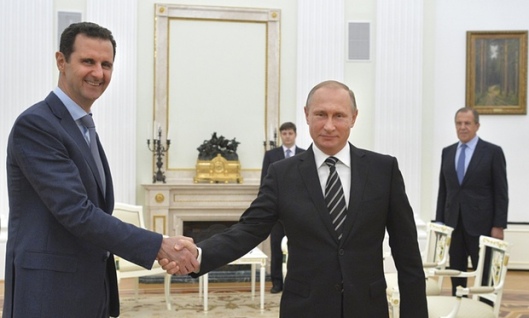



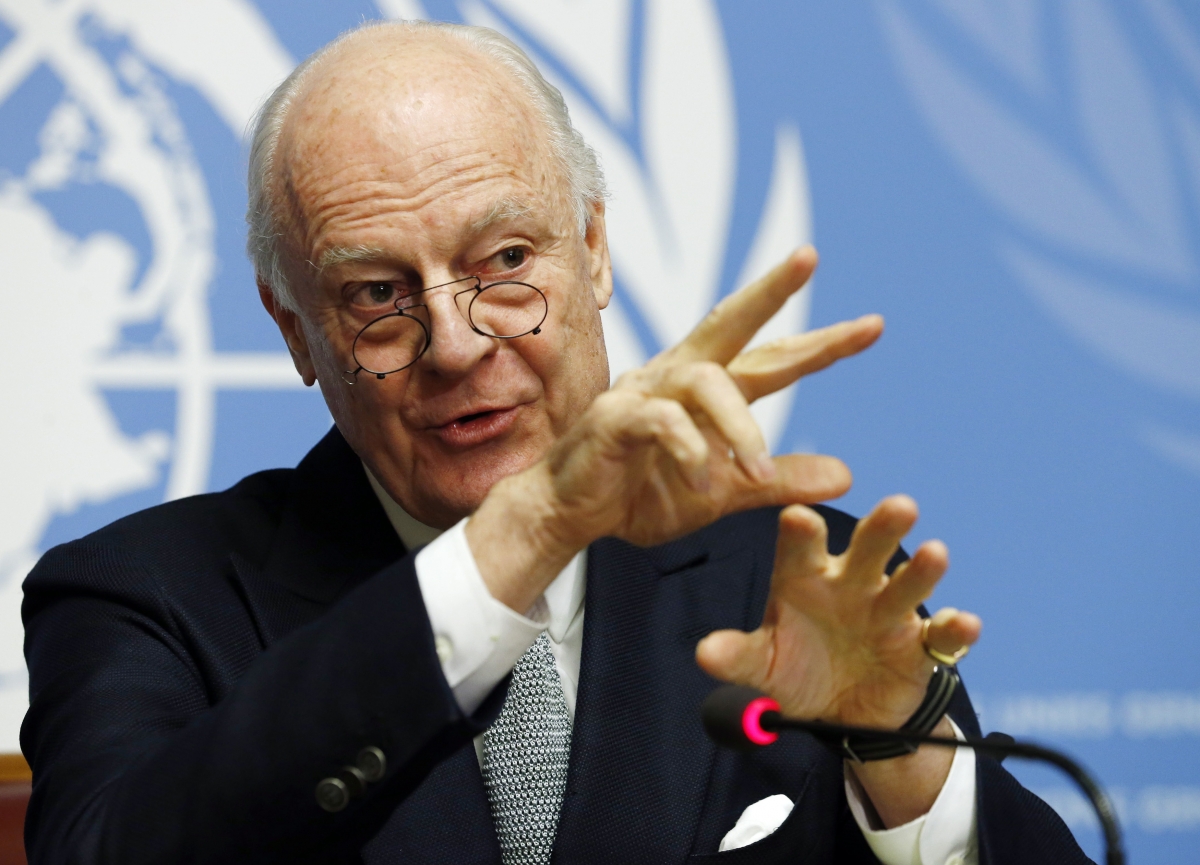


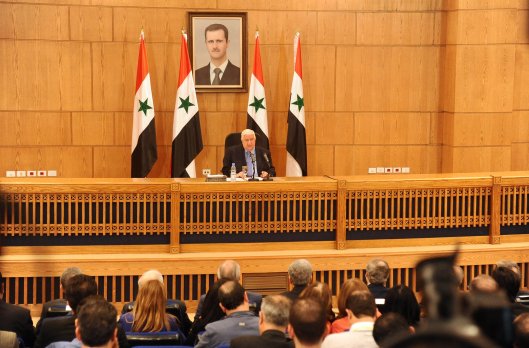
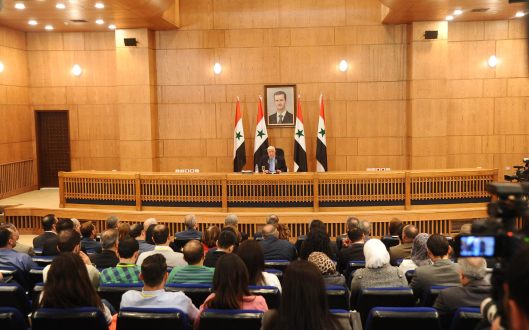
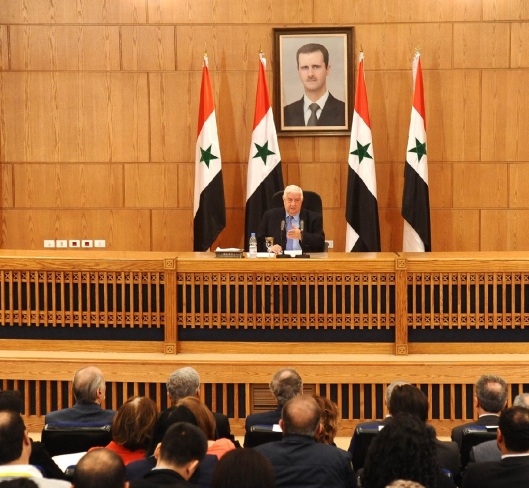

 Syrian Deputy Prime Minister, Foreign and Expatriates Minister Walid al-Moallem said Saturday UN Special Envoy for Syria Staffan de Mistura has no right to talk about Syrian presidential elections, noting that the Syrian Arab Republic delegation will not wait in Geneva forever for other parties to decide to show up.
Syrian Deputy Prime Minister, Foreign and Expatriates Minister Walid al-Moallem said Saturday UN Special Envoy for Syria Staffan de Mistura has no right to talk about Syrian presidential elections, noting that the Syrian Arab Republic delegation will not wait in Geneva forever for other parties to decide to show up.

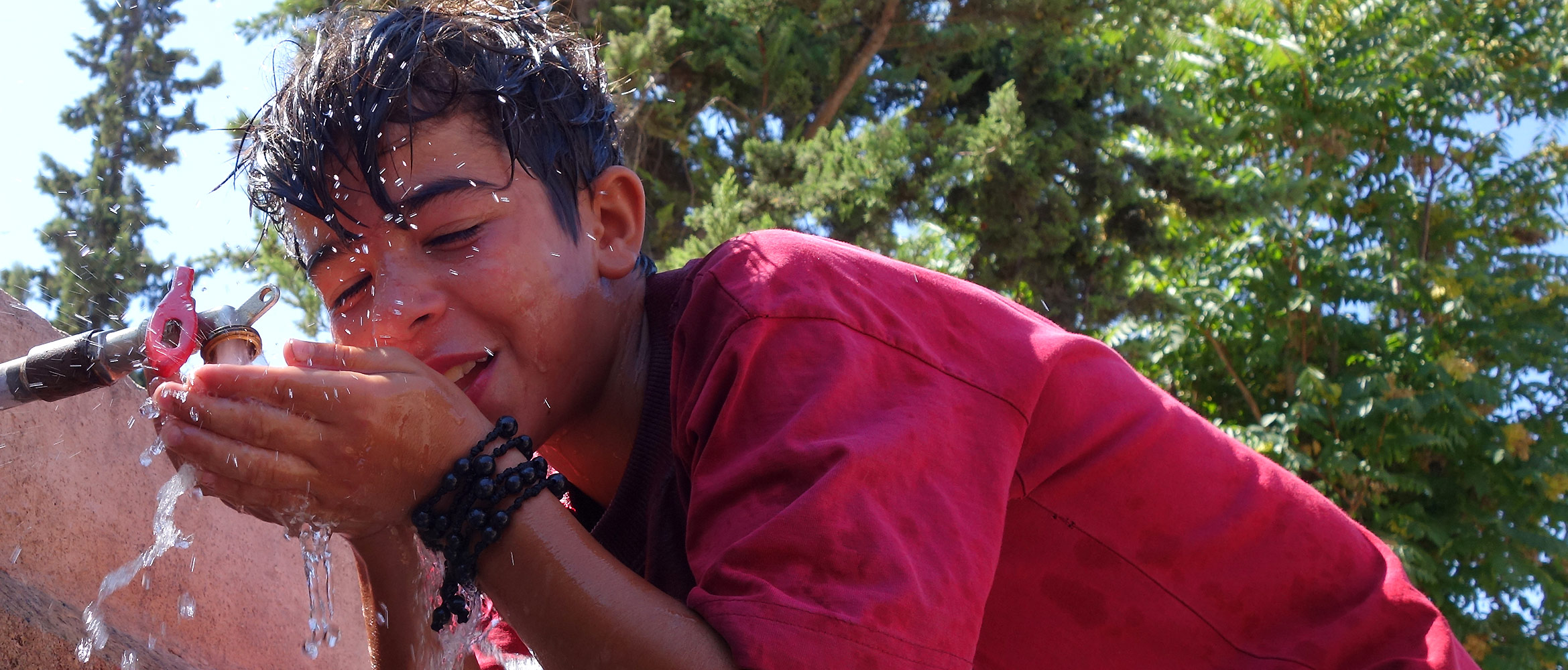








 Syrian President Bashar Assad’s Media advisor, Bouthaina Shaaban, said that the campaign launched by the Syrian army and allies in Aleppo aims at regaining control over the northern province and securing the border with Turkey.
Syrian President Bashar Assad’s Media advisor, Bouthaina Shaaban, said that the campaign launched by the Syrian army and allies in Aleppo aims at regaining control over the northern province and securing the border with Turkey.


